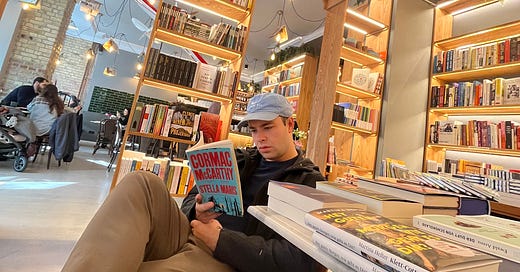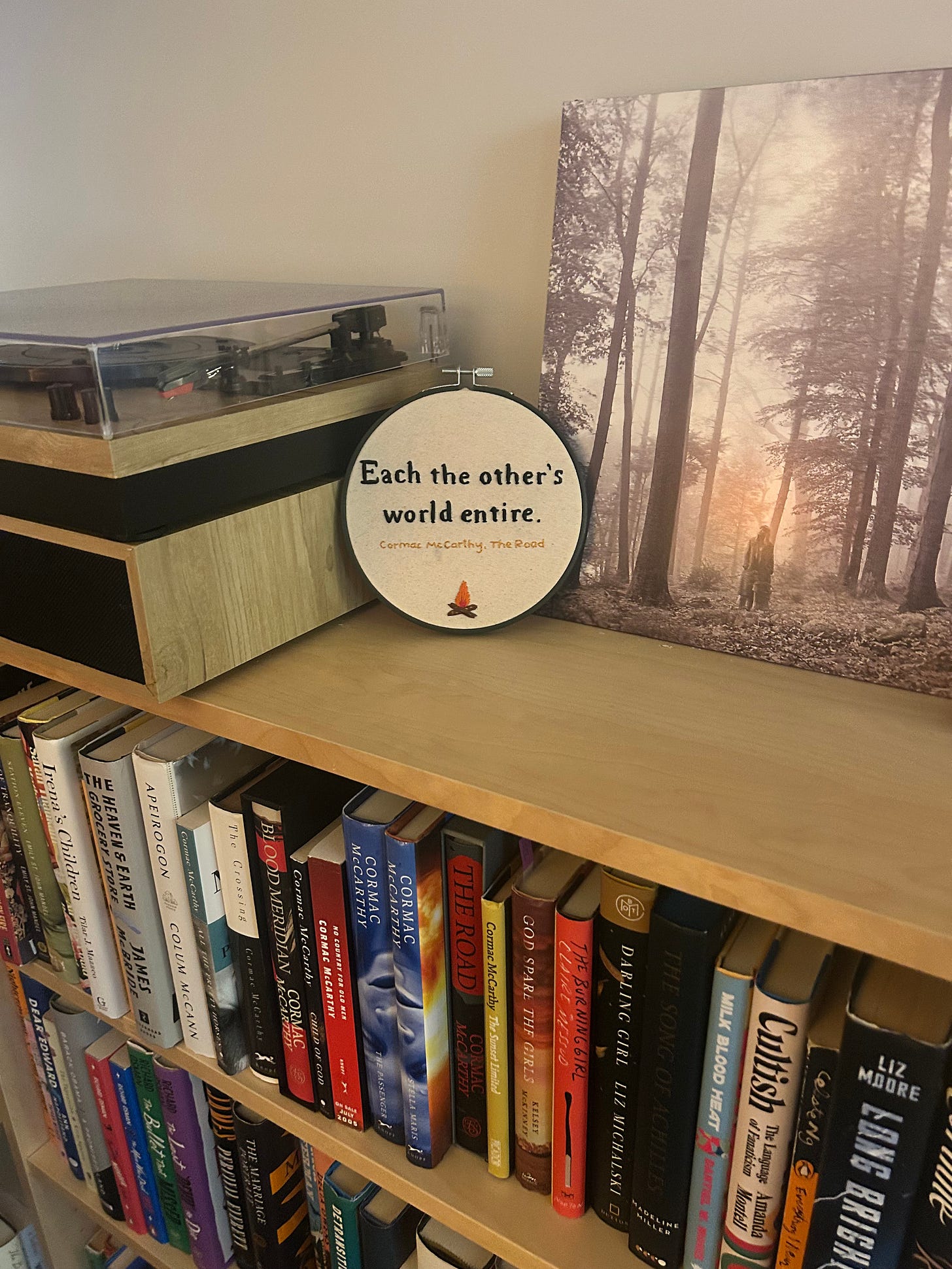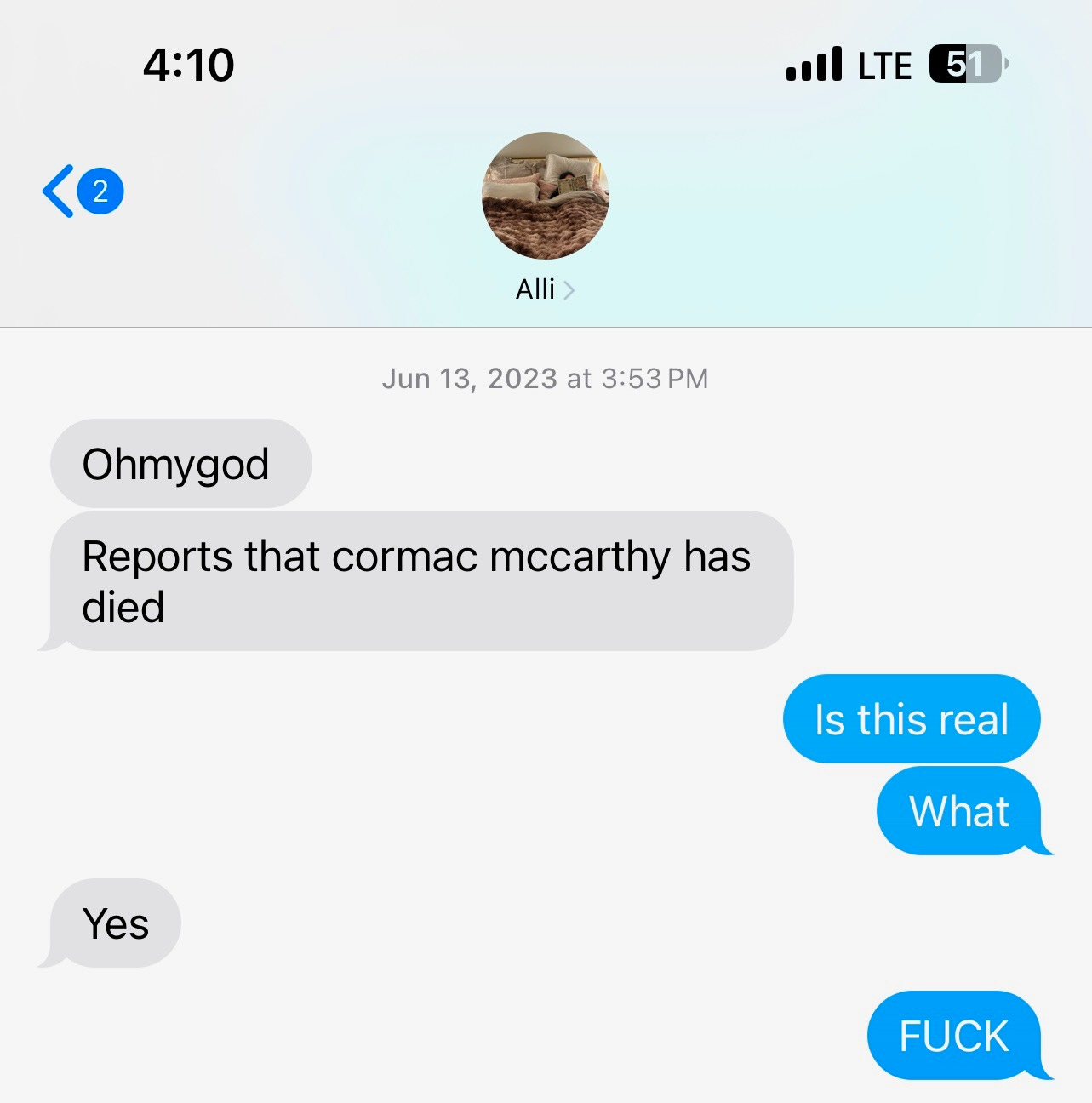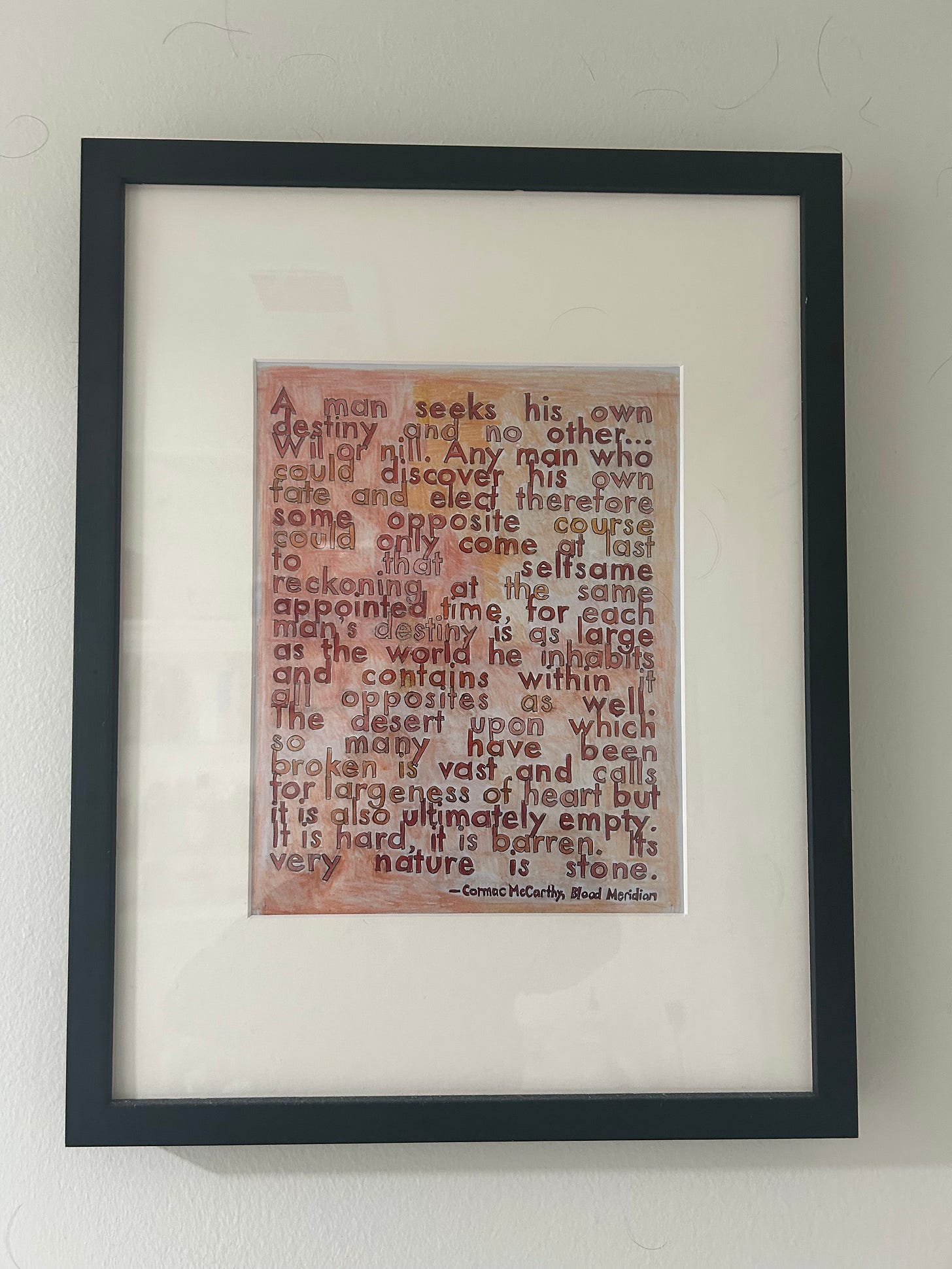Last month, a blockbuster Vanity Fair piece about Cormac McCarthy sent shockwaves across the literary community. Among other disturbing details, we learned that when the heralded author was 42, he met and allegedly entered into a romantic relationship with a teenage girl, forging her birth certificate so that he could take her to Mexico, where they had sex.
Huge yikes.
Although I enjoyed McCarthy’s books very much, I was largely spared the devastation of finding out one of your favorites is actually a mega creep.1 Mostly, I felt sad for my boyfriend, a self-proclaimed “Cormac Head.” (This has been a bad month for him, artist wise. His favorite musician? Zach Bryan.)
After sending texts and long voice memos about this for weeks, I wanted him to wring out his thoughts on this deeply upsetting revelation with the Bookpeach community.
Okay, I’ll let him take it from here!
A dispatch from Paul:
As the old saying goes, "What good is your partner’s (wonderful) fiction newsletter if you can’t co-opt it to publicly lament your favorite author’s disturbing transgressions?” I’ll try to keep this brief.
As readers of this newsletter know, whenever two fiction fans get together it's only a matter of time before one asks "who is your favorite author?" For the longest time, my answer was immediate and unwavering: Cormac McCarthy.
I first became a McCarthy-ite after reading “The Road” in my high school English class. I'd never experienced anything quite like it. McCarthy's pen, to my mind, was unmatched. The dark subject matter, the beautiful prose, the sentences that would thunder on for pages. I was hooked.
In the 10 years since that introduction, I've read his complete catalogue, offered some amateur commentary on McCarthy forums (yikes) and even contemplated a visit to Texas State University, which boasts a comprehensive collection of McCarthy drafts, papers and letters.
I would tell anyone who would listen (mostly just Alli) that you could open any McCarthy book to any page and find pure poetry. Two of my favorite samplings:
He walked out in the gray light and stood and he saw for a brief moment the absolute truth of the world. The cold relentless circling of the intestate earth. Darkness implacable. The blind dogs of the sun in their running. The crushing black vacuum of the universe. And somewhere two hunted animals trembling like ground-foxes in their cover. Borrowed time and borrowed world and borrowed eyes with which to sorrow it. – “The Road”
He thought that in the beauty of the world were hid a secret. He thought that the world’s heart beat at some terrible cost and that the world’s pain and its beauty moved in a relationship of diverging equity and that in this headlong deficit the blood of multitudes might ultimately be exacted for the vision of a single flower. – “All the Pretty Horses”
But it wasn’t just his books, it was him. I deeply admired how McCarthy lived life on his own terms. He didn’t do interviews, offer book blurbs or give any insight into his writing process. When it appeared for a moment that he had joined Twitter, his publisher put out a statement noting the account was fake and that McCarthy “doesn’t own a computer.”
He felt in so many ways like someone from a different era, uncompromising in his beliefs even when he was an obscure author who barely made ends meet. As his ex-wife recalled to The New York Times, “Someone would call up and offer him $2,000 to come speak at a university about his books. And he would tell them that everything he had to say was there on the page. So we would eat beans for another week.”
I took a lot of lessons from these stories, as many McCarthy fans did, about what it means to be resolute – to protect the things you value, even when it’s all but impossible.
It was exciting, then, when Vanity Fair published an article on McCarthy (who died last year) titled Cormac McCarthy's Secret Muse Breaks Her Silence After Half a Century: "I Loved Him. He Was My Safety." McCarthy was exceptionally reclusive -- not quite Salinger, but not far off either -- so any insight into his life or writing process was quite welcome in my book.
It quickly became clear that this was something else entirely.
Despite the somewhat innocent framing of the headline, the article details how, in the 1970s, McCarthy, then 42-years-old, allegedly started a relationship with a 16-year-old he met at a motel pool. The Guardian summed up the start of their relationship this way:
He started writing her explicit letters. Within a year, McCarthy had had Britt’s birth certificate forged so that she would appear old enough for an international visa, and taken her to Mexico, where he began to have sex with the girl. She says he spoke frequently of his knowledge of all the various laws he was breaking by having sex with her. It wasn’t until they returned to the United States that Britt discovered that McCarthy was married.
At risk of sounding melodramatic, reading this just crushed me. There are plenty of more unflattering details that I won’t include here, but you get the point. Beyond the likely illegality, the behavior described here is deeply and unequivocally wrong. Virtuous people do not behave this way.
It’s been hard to square these revelations with the author I thought I knew. People are complex and layered, sure, but this collision of McCarthy’s persona and actions feels unusually incongruous.
Herein lies the danger of parasocial relationships, I think. It’s possible that McCarthy was close to who I thought he was, save for a morally-bankrupt relationship. It’s also possible the person I imagined him to be never actually existed.
Books are quite powerful in that, if you read enough of an author, you feel like you know them. You spend hours together. Their characters feel like your friends, their settings like your neighborhood. This false familiarity can be amplified when said author offers little in the way of personal information. It’s easy – fun, even – to fill that void with who you want them to be, not who they are.
The same can be said of other mediums. But there's something about reading -- how inherently active it is, perhaps -- that lends itself to a creator-consumer relationship that feel intimate even when it affiliative.
Careful reading, friends.
For more on the McCarthy fallout, I recommend this excellent Slate interview.
📚 On my shelf
Still plugging away at “The Wedding Party” and loving it.
When I was at a used bookstore this weekend, I picked up two older books — “Middlesex” by Jeffrey Eugenides (2002) and “Sophie’s Choice” by William Styron (1979). I tried to read both years ago, and couldn’t get past the first fifty pages. I think I was too young, so am trying again a decade later. Will keep y’all posted!
📚 Links and Things
Take five minutes to watch Clarissa Ward’s incredible report from a notorious Assad prison to really feel the impact of a free Syria.
I love this New Yorker piece on the booming business of breakups: get-over-him getaways, ketamine-assisted heartbreak therapy, and more ❤️💰
My sister and I saw "Wicked” last week, and I adored it, thanks in large part to the terrific performances. Cynthia Erivo’s expressions, especially during “Dancing Through Life,” were truly exceptional. To dig a bit deeper, I recommend this video of Erivo performing in “The Color Purple” at the 2016 Tony’s. (She comes in at 2:54). Makes me cry and covers me in full body chills EVERY TIME.
For more on this, I recommend “MONSTERS: A Fan’s Dilemma” in which Claire Dederer opines on WTF to do with folks like Philip Roth, Roman Polanski, and Woody Allen.







